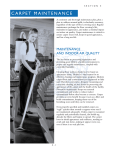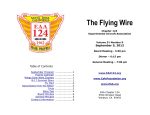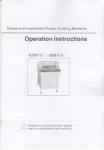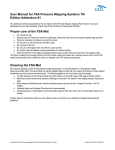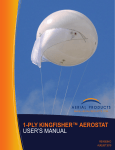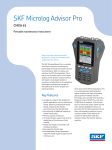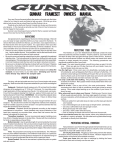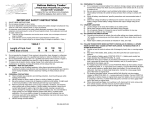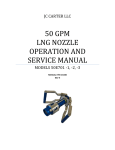Download powered parachute canopy user/owner manual
Transcript
POWERED PARACHUTE CANOPY USER/OWNER MANUAL Performance Designs, Inc. 1300 International Speedway Blvd DeLand, Florida USA 32724 (386) 738-2224 Fax: (386) 734-8297 Dear User/Owner; Welcome to the world of Powered Parachute flight! This document does not represent a complete owner’s manual for your powered parachute system. The following information is provided as a supplement to your ultralight owner’s manual (supplied by your ultralight manufacturer). It is not meant to be an instructional manual on how to fly a powered parachute. The information contained in this manual will help you understand some of the technical terminology used, as it applies to the canopy portion of your powered parachute system. Please take note of the care and maintenance information included, so that you may enjoy your powered parachute for hundreds of hours of flight. Performance Designs hopes you enjoy your canopy and that you always fly safely. Thank you, PERFORMANCE DESIGNS, INC. TO THE NEW OWNER INSTALLATION The canopy comes with a card that is attached to the quick links for easy identification and installation. Take the canopy out of the plastic bag. Place the unfolded canopy on the ground behind the machine. Unfolding the canopy carefully, locate the daisy-chained lines and slide them out of the folds of the canopy. Do Not remove the card from the links at this time. Do Not remove the lines from the quick links. Stand behind the machine with your back to the machine facing the canopy with the card and the quick links in your hand. Hold the printed part of the card facing the canopy and the writing on the card upside down. Holding the card in this manner places the leading edge links (front of the canopy) on the top and the trailing edge (back of the canopy) on the bottom. Lay the card on the ground and take out the daisy chain and resume unfolding the parachute. Turn the canopy so that as you continue to unfold it the leading edge lines are straight leading to the top of the canopy and the trailing edge lines are straight leading to the tail of the canopy. Take the links off the card one at a time as you attach the canopy to the machine following the manufacturer’s instructions. Resume unfolding the canopy with the top skin on the ground and the bottom skin and lines on top. Starting at the machine, take the top link and follow the lines with your eyes making sure that the lines are leading straight to the parachute and not tangled with the trailing lines. If they are, shake the lines lightly and the top and bottom lines will separate. Performance Designs, Inc. Powered Parachute Canopy Care and Maintenance The canopy of your powered parachute system should be inspected before and after each flight. Inspection Procedure (Performed before and after each flight) Preflight: 1. Make sure there is no debris inside the canopy by lifting at the tail and shaking down towards the leading edge. 2. Lay the canopy flat, with the bottom surface down on a table or any clean, flat surface. Begin at one end, visually inspecting each panel and seam thoroughly, one panel at a time. Check for any burns, rips, tears, failed seams, etc. 3. Turn the canopy over and repeat the above procedure for the bottom surface. Included in the inspection of the bottom surface will be the line attachments and lines themselves. 4. Ensure that there are no twists in the line groups. Look for frayed lines. Try to keep the lines clean. Dirt that gets into the lines abrades the lines from inside. 5. Connect the canopy to the machine ensuring that the control lines are routed through the proper pulleys and that they travel freely. Tighten the quick links following the manufacturers recommendations for tightness. Post flight: 1-4. Repeat steps 1, 2, 3 and 4 above. 5. Periodically check the fabric strength after use. (See fabric information). Your canopy can be wiped down, when needed, with a damp (not wet) soft cloth. Avoid getting any petroleum-based substances on your canopy or lines. These agents can do a great deal of damage! Avoid contact with the prop and exhaust. Fabric Information Although the fabric used in your powered parachute is UV resistant, it has been our experience that sunlight will have a detrimental effect on the fabric. The longer the exposure to sunlight, the shorter the life span of the fabric. This is more noticeable on the neon colors. Neon colors will show fading faster. Neon’s include lime green, lemon, watermelon, and tangerine When new the tensile strength of the fabric is specified to be 47 psi. The tear strength is specified at 12 psi. After use, the user can check the fabric strength as follows: 1. Select a section of the top or bottom skin, as far away from seam lines as is feasible. 2. Grasp the fabric with both hands approximately six inches apart. 3. Pull the fabric tight and apply pressure to the fabric with the thumbs; the fabric should take some stress (20 -25 lbs. pressure). Use caution when performing tests...fingernail and thumbnails are sharp objects and could do damage. Factory Maintenance Your canopy should be returned to the factory for any of the following maintenance needs: 1. Upper suspension line replacement. 2. Any rips, tears, etc. to the canopy fabric. 3. Every 100 flight hours for a full airworthiness inspection. 4. Anytime contamination is suspected. Performance Designs, Inc. 500 Square Foot Powered Parachutes (Sunriser) Technical Data Sheet Fabric Type Silicone coated 1.1 oz. ripstop nylon Reinforcing Tapes 3/8" MIL-T-5038 200 lb. min. breaking strength 1/2" nylon 200 lb. min. breaking strength 3/8" nylon 150 lb. min. breaking strength Line Attachment Tapes 3/4" MIL-W-4088 600 lb. min. breaking strength Threads Size E MIL-T-7807 8.5 lb. min. breaking strength Size F MIL-T-7807 11 lb. min. breaking strength Suspension Lines/ Upper Control Lines Polyethylene - 825 lb. Tensile strength (upper) Lower Control Lines - (red lines) Polyester - 1,000 lb. Tensile strength Description The canopy consists of: 13 cells or chambers, 12 loaded ribs, 13 non loaded ribs, 2 Inflatable stabilizers, 16 ea A, B, C and D lines, 2 ea. AX, BX, CX, DX, E, F lines, 12 upper control lines, 2 lower control lines (red lines). Canopy Shape and Construction Method Rectangular shape with 13 top skins, 13 bottom skins, 2 inflated stabilizers. Flight Performance Data Speed Range - 26 to 30 mph. Weight Adjustments For Landing Conditions -Reduce all weight by 2% per 1000 ft (300M) landing elevation -Reduce all weight by an additional 1% for every 3° C (5° F) above standard day temperature, which is 15° C (59° F) at sea level. Canopy Size Chord Span Cell Width - 500 Sq. Ft./ 46.44 sq. M. - 12.60 Ft. / 3.84 M. - 39.5 Ft. / 12.06 M. - Top 36 ½” Bottom 33” Wing Loading This is at the discretion of the machine manufacturer. Wing loading in this instance is defined as the maximum impact of the machine at landing without sustaining major damage to the vehicle, pilot or passenger. It also should not decrease the ascent rate or increase the descent rate beyond the comfort zone of the pilot and passenger. S U N R IS E R FRONT C ELL # 12 10 8 6 4 2 1 3 5 7 9 11 13 A3 A2 A2 A2 A2 A2 A1 AX AX A1 A2 A2 A2 A2 A2 A3 B3 B2 B2 B2 B2 B2 B1 BX BX B1 B2 B2 B2 B2 B2 B3 C3 C2 C2 C2 C2 C2 C1 CX CX C1 C2 C2 C2 C2 C2 C3 D3 D2 D2 D2 D2 D2 D1 DX DX D1 D2 D2 D2 D2 D2 D3 UST 1 UST 3 UST 5 U ST 7 UST 9 U ST 11 E1 E1 F1 F1 REAR LST Performance Designs, Inc. 500 Square Foot Powered Parachutes (Windjammer) Technical Data Sheet Fabric Type Silicone coated 1.1 oz. ripstop nylon Polyurethane/Silicone blend coated 1.5 oz. ripstop nylon Reinforcing Tapes 3/8" MIL-T-5038 200 lb. min. breaking strength 3/4" MIL-T-5608 100 lb. min. breaking strength 1/2" nylon 200 lb. min. breaking strength 3/8" nylon 150 lb. min. breaking strength Line Attachment Tapes 3/4" MIL-W-4088 600 lb. min. breaking strength Threads Size E MIL-T-7807 8.5 lb. min. breaking strength Size F MIL-T-7807 11 lb. min. breaking strength Suspension Lines/ Upper Control Lines Polyethylene - 825 lb. Tensile strength (upper) Lower Control Lines - (red lines) Polyester - 1,000 lb. Tensile strength Description The canopy consists of: 13 cells or chambers, 12 loaded ribs, 13 non loaded ribs, 2 Inflatable stabilizers, 16 ea A, B, C and D lines, 2 ea. AX, BX, CX, DX, E, F lines, 12 upper control lines, 2 lower control lines (red lines). Canopy Shape and Construction Method Rectangular shape with 13 top skins, 13 bottom skins, 2 inflated stabilizers. Flight Performance Data Speed Range - 26 to 30 mph. Weight Adjustments For Landing Conditions -Reduce all weight by 2% per 1000 ft (300M) landing elevation -Reduce all weight by an additional 1% for every 3° C (5° F) above standard day temperature, which is 15° C (59° F) at sea level. Canopy Size Chord Span Cell Width - 500 Sq. Ft./ 46.44 sq. M. - 12.60 Ft. / 3.84 M. - 39.5 Ft. / 12.06 M. - Top 36 ½” Bottom 33” Wing Loading This is at the discretion of the machine manufacturer. Wing loading in this instance is defined as the maximum impact of the machine at landing without sustaining major damage to the vehicle, pilot or passenger. It also should not decrease the ascent rate or increase the descent rate beyond the comfort zone of the pilot and passenger. W IN D J A M M E R FRONT CELL # 12 10 6 8 4 2 1 3 5 7 9 11 13 A7 A6 A5 A4 A3 A2 A1 AX AX A1 A2 A3 A4 A5 A6 A7 B7 B6 B5 B4 B3 B2 B1 BX BX B1 B2 B3 B4 B5 B6 B7 C7 C6 C5 C4 C3 C2 C1 CX CX C1 C2 C3 C4 C5 C6 C7 D7 D6 D5 D4 D3 D2 D1 DX DX D1 D2 D3 D4 D5 D6 D7 UST 1 UST 2 UST 3 UST 4 UST 5 UST 7 UST 9 E2 E1 E1 E2 F2 F1 F1 F2 REAR LST Performance Designs, Inc. 500 Square Foot Powered Parachutes (Barnstormer) Technical Data Sheet Fabric Type Silicone coated 1.1 oz. ripstop nylon Reinforcing Tapes 3/8" MIL-T-5038 200 lb. min. breaking strength 1/2" nylon 200 lb. min. breaking strength 3/8" nylon 150 lb. min. breaking strength Line Attachment Tapes 3/4" MIL-W-4088 600 lb. min. breaking strength Threads Size E MIL-T-7807 8.5 lb. min. breaking strength Size F MIL-T-7807 11 lb. min. breaking strength Suspension Lines/ Upper Control Lines Polyethylene - 825 lb. Tensile strength (upper) Lower Control Lines - (red lines) Polyester - 1,000 lb. Tensile strength Description The canopy consists of: 11 cells or chambers with Mylar stiffeners sewn to the leading edge of the ribs, 12 loaded ribs, 11 non loaded ribs, 2 stabilizers, 12 ea A, B, C and D lines, 2 ea. AX, BX, CX, DX, E, F lines, 12 upper control lines, 2 lower control lines (red lines). Canopy Shape and Construction Method Semi Elliptical shape, with 11 top skins, 11 bottom skins, 2 stabilizers. Flight Performance Data Speed Range - 26 to 30 mph. Weight Adjustments For Landing Conditions -Reduce all weight by 2% per 1000 ft (300M) landing elevation -Reduce all weight by an additional 1% for every 3° C (5° F) above standard day temperature, which is 15° C (59° F) at sea level. Canopy Size Chord Span Cell Width - 500 Sq. Ft./ 46.44 sq. M. -12.88 Ft. / 3.93 M. - 39.33 Ft. / 11.99 M. - Top, Varies depending on the cell Bottom, Varies depending on the cell Wing Loading This is at the discretion of the machine manufacturer. Wing loading in this instance is defined as the maximum impact of the machine at landing without sustaining major damage to the vehicle, pilot or passenger. It also should not decrease the ascent rate or increase the descent rate beyond the comfort zone of the pilot and passenger. B A R N S TO R M E R FR O N T C E LL # 10 8 6 4 2 1 3 5 7 9 11 A 6 A 5 A 4 A 3 A 2 A 1 A X A X A 1 A 2 A 3 A 4 A 5 A 6 B 6 B 5 B 4 B 3 B 2 B 1 B X B X B 1 B 2 B 3 B 4 B 5 B 6 C 6 C 5 C 4 C 3 C 2 C 1 C X C X C 1 C 2 C 3 C 4 C 5 C 6 D 6 D 5 D 4 D 3 D 2 D 1 D X D X D 1 D 2 D 3 D 4 D 5 D 6 U S T 1 U S T 2 U S T 3 U S T 4 U ST 5 U S T 7 E 1 E 1 F1 F1 R E A R LS T Performance Designs, Inc. 400 Square Foot Powered Parachutes (Barnstormer) Technical Data Sheet Fabric Type Silicone coated 1.1 oz. ripstop nylon Reinforcing Tapes 3/8" MIL-T-5038 200 lb. min. breaking strength 1/2" nylon 200 lb. min. breaking strength 3/8" nylon 150 lb. min. breaking strength Line Attachment Tapes 3/4" MIL-W-4088 600 lb. min. breaking strength Threads Size E MIL-T-7807 8.5 lb. min. breaking strength Size F MIL-T-7807 11 lb. min. breaking strength Suspension Lines/ Upper Control Lines Polyethylene - 825 lb. Tensile strength (upper) Lower Control Lines - (red lines) Polyester - 1,000 lb. Tensile strength Description The canopy consists of: 11 cells or chambers with Mylar stiffeners sewn to the leading edge of the ribs, 12 loaded ribs, 11 non loaded ribs, 2 stabilizers, 12 ea A, B, C and D lines, 2 ea. AX, BX, CX, DX, E, F lines, 12 upper control lines, 2 lower control lines (red lines). Canopy Shape and Construction Method Rectangular shape with 11 top skins, 11 bottom skins, 2 stabilizers. Flight Performance Data Speed Range - 26 to 30 mph. Weight Adjustments For Landing Conditions -Reduce all weight by 2% per 1000 ft (300M) landing elevation -Reduce all weight by an additional 1% for every 3° C (5° F) above standard day temperature, which is 15° C (59° F) at sea level. Canopy Size - 400 Sq. Ft./ 46.44 sq. M. Chord -11.43 Ft. / 3.48 M. Span - 34.96 Ft. / 10.66 M. Wing Loading This is at the discretion of the machine manufacturer. Wing loading in this instance is defined as the maximum impact of the machine at landing without sustaining major damage to the vehicle, pilot or passenger. It also should not decrease the ascent rate or increase the descent rate beyond the comfort zone of the pilot and passenger. B A R N S TO R M E R FR O N T C E LL # 10 8 6 4 2 1 3 5 7 9 11 A 6 A 5 A 4 A 3 A 2 A 1 A X A X A 1 A 2 A 3 A 4 A 5 A 6 B 6 B 5 B 4 B 3 B 2 B 1 B X B X B 1 B 2 B 3 B 4 B 5 B 6 C 6 C 5 C 4 C 3 C 2 C 1 C X C X C 1 C 2 C 3 C 4 C 5 C 6 D 6 D 5 D 4 D 3 D 2 D 1 D X D X D 1 D 2 D 3 D 4 D 5 D 6 U S T 1 U S T 2 U S T 3 U S T 4 U ST 5 U S T 7 E 1 E 1 F1 F1 R E A R LS T

















